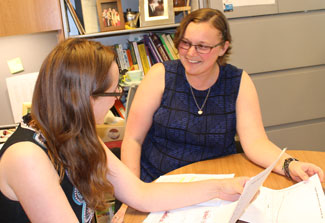Fogarty Scholar Dr Emily Vogtmann studies cancer threats in China
September / October 2015 | Volume 14, Issue 5

Photo courtesy of Dr. Emily Vogtmann
As a Fogarty Scholar, Dr. Emily Vogtmann investigated the
possible link between cruciferous vegetable intake and
colorectal cancer risk in men with a specific gene.
By Cathy Kristiansen
For an epidemiologist and cancer researcher like Dr. Emily Vogtmann, having access to two large datasets on Chinese men and women was like opening a treasure chest. She could mine the data to discover whether diverse exposures such as a troublesome gallbladder or a diet high in cabbage might influence the risk of various cancers.
Vogtmann was able to make productive use of these databases during her fellowship in Shanghai. She was there as part of
Fogarty’s Global Health Program for Fellows and Scholars, which provides yearlong mentored clinical research experiences overseas for postdoctoral fellows and pre-doctoral scholars. Support was also provided by NIH's National Cancer Institute (NCI).
Because the datasets were already established and translated into English, Vogtmann could start doing research from the get-go. "It was perfect to have these really large cohorts to work on right away," she said. "I was able do so much while I was there." She completed three research projects, advanced her doctoral dissertation and published five first-author papers. She is now a Cancer Prevention Fellow in NCI’s Nutritional Epidemiology Branch, investigating potential links between upper gastrointestinal cancer and the microbiome - an interest that developed during her fellowship.
One of her projects in China aimed to clarify previous contradictory evidence about whether having a history of gallstones or having a gallbladder removed raised the risk of liver cancer. By analyzing outcomes over time for both men and women, Vogtmann and her team showed that gallstones did appear to increase the risk of liver cancer, although findings were less convincing for gallbladder removal.
In another study, Vogtmann examined the relationship between eating cruciferous vegetables, such as broccoli, cabbage and kale, and developing colorectal cancer. She first assessed how accurately people recalled their food consumption by measuring urine levels of the compound isothiocyanate, which is produced by eating these vegetables. She also studied whether cruciferous vegetables or isothiocyanate fueled the risk of colorectal cancer in people with mutations in a particular gene, and found they did not.
Among the new skills Vogtmann learned in China was how to appropriately handle diet data - knowledge now pertinent in her NCI research. This includes accounting for different components in what is consumed, such as someone eating 1,000 calories in fruits and vegetables and nothing else, versus someone with the same vegetable tally plus 2,000 calories in rice. "When you analyze a dietary factor, you typically have to adjust to total energy intake and there are different methods for doing that," she explained. "I worked with statisticians to learn how to calculate these in the standard way."
Along with her research in China, Vogtmann presented her work to physicians and mentored some colleagues. "It was very collaborative there," she said. "I was able to critically review their manuscripts and help them edit in a format that would be easy to understand. And they would go over my manuscripts to make sure I was describing the cohort correctly."
Her nutritional research in China heightened her curiosity about diet's variable influence on the risk of cancer and other health conditions, and how it might be tied to microbial differences in the gut. Networking with her scholarship mentors and research partners led to her current NCI position, she noted.
Vogtmann said her Fogarty fellowship played a "huge role" in developing her career. "It prepared me to be an independent scientist. I was able to propose ideas, work at my pace, work on multiple projects - it was really a great opportunity."
More Information
To view Adobe PDF files,
download current, free accessible plug-ins from Adobe's website.